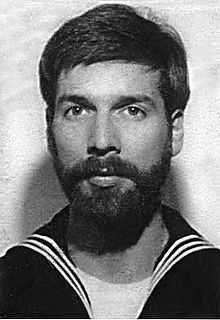Glenn Michael Souther

Glenn Michael Souther (January 30, 1957, Hammond, Indiana to June 22, 1989, Moscow, Soviet Union), also known as Mikhail Yevgenyevich Orlov, was a U.S. Navy photographer who gave up U.S. citizenship to become a Soviet citizen in 1986.[1] At first, when he asked for Soviet citizenship, Soviet counter-intelligence was confused, suspecting him of being a CIA-plant, sent on an espionage mission.[1] However, after Soviets found out that there was no secret plot behind his endeavour, they quickly promoted him from NCO up to the Major's rank.[1] He settled down in the USSR, married a Russian woman, who taught English in one of the Moscow universities.[1] Three years after his defection he committed suicide, aged 32.[1]
Biography
After graduating from high school in 1975 in Cumberland, Maine, Souther enlisted in the United States Navy and was trained as a photographer. He served on the USS Nimitz (CVN-68) from July 1976 to November 1978. From April 1979 to 1982, he was stationed with the United States Sixth Fleet in Italy, where he married an Italian woman. In Italy in 1980, he was recruited as a Soviet spy by experienced KGB officer Boris Solomatin, who had earlier recruited and handled John Anthony Walker. According to Solomatin, Souther was an ideological spy and not motivated by money.[2]
In 1982, Souther was given an honorable discharge from the Navy with a rank of petty officer first class to study Russian literature in Old Dominion University. Simultaneously, he worked as a reservist at the Atlantic fleet intelligence center in Norfolk, where he was assigned to a laboratory processing satellite-reconnaissance photos and also may have been privy to sensitive communications intercepts. In 1981, his estranged wife approached a Navy officer to report that Souther was a spy. These allegations were not taken seriously until John Anthony Walker's arrest in 1985. Thereafter, he was interrogated by the FBI but not charged due to a lack of evidence.[3] Soon afterwards, in May 1986, Souther asked for the Soviet citizenship.[4]
He did not publicly resurface until July 20, 1988, when a television interview program with a segment about him was broadcast on Soviet Central Television. In the program, he spoke about his own disillusionment with American nuclear policies and his love for the works of Russian poet Vladimir Mayakovsky. He also discussed and criticized several American intelligence operations in which he took part, including the 1986 bombing of Libya and the analysis of the Chernobyl disaster.[5] While in the Soviet Union, he married a Russian woman named Lena and had a daughter.[6] He was awarded an Order of Friendship of Peoples and was one of the few foreign agents and defectors given officer rank in the KGB, where he was made a major after his defection.[7]
Death

On June 22, 1989, at the age of 32, Souther reportedly committed suicide by asphyxiation after sealing himself in his garage and starting his car. Russian newspapers suggested he had been depressed by living far from his birthplace. His death was announced by the Red Star newspaper, and he was eulogized by KGB chairman Vladimir Kryuchkov, who considered him to be very important agent.[5] He was buried in Kuntsevo Cemetery.
His suicide note contained the following text:[1]
I don't have any regrets about our relations. They were the long ones, they helped me to establish myself as an individual. Everyone was tolerant, and fair towards me. I hope that you, as it was always, forgive me the unwillingness to engage the last battle.[1]
original text (Russian): Я ни в коей мере не сожалею о наших отношениях. Они были продолжительными и помогли мне вырасти как личности. Все были терпимы и добры ко мне. Надеюсь, вы, как это было всегда, простите меня за то, что я не захотел пойти в последний бой.
Despite some expressions which make it clear that it has been written by a foreigner, such as "as it was always," which is unusual for native Russian-speakers, who use the shortened form "as always," the note itself has been written in coherent, literary Russian.
In his earlier notes of 1988 he claimed that Russia was his Dreamland, the land which astonished him, despite the loneliness he suffered while living far from the places he was born to.[1]
External links
Notes
- ↑ 1.0 1.1 1.2 1.3 1.4 1.5 1.6 1.7 Poroskov N. He gave Russia thousands of Nuke secrets (Russian) June 15, 2006
- ↑ Earley, Pete. "Boris Solomatin, interview by Pete Earley". Trutv. Retrieved 16 August 2012.
- ↑ "Ex-Wife of Dead Spy Told Navy He Worked for Soviets, U.S. Says". New York Times. 29 June 1989. Retrieved 16 August 2012.
- ↑ Soviet Union The Odd Case of M. Orlov. TIME. 10 July 1989. Retrieved 16 August 2012.
- ↑ 5.0 5.1 "Defector to Moscow Is Dead; Work for K.G.B. Is Lauded". New York Times. 28 June 1989. Retrieved 16 August 2012.
- ↑ "The Dutch and American Gase and related families". Gase. Retrieved 16 August 2012.
- ↑ "Соутер Гленн Майкл". SVR. Retrieved 16 August 2012.
|